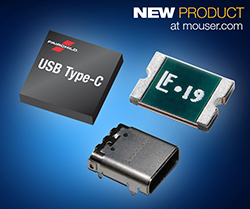Infineon and Wurth Release the XMC Digital Power Explorer Kit
Mouser Electronics is now stocking the XMC Digital Power Explorer Kit from Infineon Technologies and Wurth Electronics. This power board with a synchronous step-down converter makes it easier for developers of analog power supplies and programmers of embedded software to create digital power supply applications. The XMC Digital Power Explorer Kit is a complete solution with hardware, software, and switchable resistance load bank.
 The Infineon and Wurth XMC Digital Power Explorer Kit, available from Mouser Electronics, incorporates Infineon’s XMC range of ARM Cortex-M microcontrollers, OptiMOS BSC0924NDI MOSFETs, and IRS2011S high- and low-side drivers. The kit’s power board features a synchronous buck converter with onboard resistive load banks, which designers can switch between 10 percent, 55 percent, and 100 percent of the maximum load. By switching the resistance, designers can test the transient response and the quality of the control loop under different load conditions. The power board features multiple test points for checking the quality of all the relevant signals. The kit also includes optional PMBus communication for easy integration in more complex power management systems.
The Infineon and Wurth XMC Digital Power Explorer Kit, available from Mouser Electronics, incorporates Infineon’s XMC range of ARM Cortex-M microcontrollers, OptiMOS BSC0924NDI MOSFETs, and IRS2011S high- and low-side drivers. The kit’s power board features a synchronous buck converter with onboard resistive load banks, which designers can switch between 10 percent, 55 percent, and 100 percent of the maximum load. By switching the resistance, designers can test the transient response and the quality of the control loop under different load conditions. The power board features multiple test points for checking the quality of all the relevant signals. The kit also includes optional PMBus communication for easy integration in more complex power management systems.
The kit includes two different control card options — a XMC1300 control card and a XMC4200 control card, both with an isolated onboard debugger — which allow designers to easy evaluate both XMC microcontroller families and make the right choice for their applications. The XMC4200 card provides a high-resolution PWM peripheral to cover the most demanding requirements in digital power control applications. Additionally, the card integrates three analog comparators with automatic slope generation (10-bits resolution), and smart post-processing that permits extremely accurate and flexible control with minimum CPU load and lowest system cost. The XMC1300 card features most of the peripherals included in XMC4200 card — such as Capture and Compare Unit (CCU) timers, analog-to-digital converter (ADC), and serial communication — and adds analog comparators and a MATH co-processor unit, which are tailored to fulfill more cost-sensitive applications.

Comments are closed, but trackbacks and pingbacks are open.